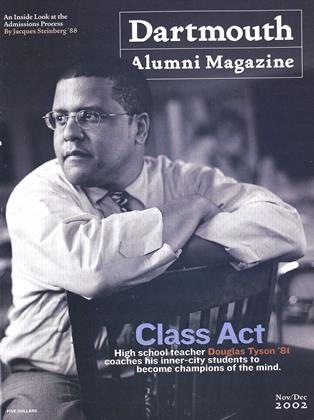QUOTE/UNQUOTE "When you go to your boss [suggesting] a $150,000 training program for your staff, it's easy for him to say, 'Not this year/ " —TUCK SCHOOL DEAN PAUL DANOS ON THE 10 PERCENT DECLINE IN ENROLLMENT LAST SUMMER FOR TUCK'S EXECUTIVE PROGRAM
WANT TO IMPROVE YOUR GRADES? Try rooming with a nerd.
According to a recent study by economics professor Bruce Sacerdote '90, the luck of the housing draw can affect more than just where a student resides. It can also affect a students grade point average (GPA), whether a student joins a fraternity or sorority, and even future earnings.
Sacerdote analyzed the Colleges randomly assigned freshmen housing assignments against term-by-term grades for the classes of' 97 and '98. He found that the GPAs of freshmen who roomed with academic aces tended to rise about a third of a grade. Rooming with less-gifted students, however, didn't pull high averages down.
Sacerdote also analyzed the effects of peers on students' decisions about joining fraternities and sororities.. He found that students were only 8 percent more likely to join a Greek organization if their roommates did and up to 32 percent more likely to go Greek if most of their hallmates joined.
That decision, in turn, may affect the career choices seniors make. According to a study of the class of 2001 by Sacerdote and one of his students, David Marmaros '01, seniors who landed high paying jobs—such as those on Wall Street—were likely to have networked with current and alumni members of their fraternities and sororities. "The people around you have a huge effect on the decisions you make," says Sacerdote. That may not be news, but by quantifying those influences the economist hopes to help policy makers evaluate how various educational programs, including school vouchers and charter schools, will affect tomorrows workers.
 View Full Issue
View Full Issue
More From This Issue
-
 Feature
FeatureThe Gatekeepers
November | December 2002 By JACQUES STEINBERG ’88 -
 Feature
FeatureIn Her Element
November | December 2002 By GEORGE BRYSON -
 Cover Story
Cover StoryHead of the Class
November | December 2002 By PETER SCOTT -
 Faculty Opinion
Faculty OpinionThe Iraq Question
November | December 2002 By Daryl G. Press -
 Classroom
ClassroomThe Art and Science of Group Dynamics
November | December 2002 By Karen Endicott -
 Outside
OutsideThe Literature of the Logbooks
November | December 2002 By Madeleine Eno







